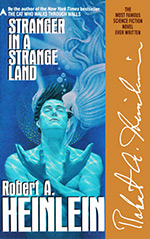
![]() nightxade
nightxade
8/5/2014
![]()
I read this because I wanted to grok the meaning of the word grok. I was introduced to the word some time ago, and was recently reminded of it via Dictionary.com's word of the day. It is a martian word that means to understand so intrinsically that the comprehension becomes as natural as breathing.
This is what Valentine Michael Smith attempts to do when he is brought to earth. Though appearing adult in physical form, Michael is but a child on his home world, and his ignorance of human culture makes him even more so. It paves the way for many people to take advantage of him, especially since, through the circumstances of his birth and relationship to the people who went on the mission to Mars years prior, he owns a lot of rights by human standards, including the rights to Mars itself--and he is entitled to a LOT of money.
Through the shenanigans of a journalist looking to protect Michael from the governmental vultures hounding him, and Gillian, the nurse who unknowingly bonded with him over a cup of water, they manage to get Michael into the hands of the irascible Jubal Harshaw. And this is where the true grokking begins.
The best way to learn how nutty and fascinating one's own culture and language is, is by trying to teach it to someone else. Michael has a lot to learn, but in the teaching, everyone around him learns too, including the reader. The book takes us on Michael's journey of growth and exploration, providing wonderful insights from the perspective of one looking in on our world, and offering lots of thought-provoking moments from Jubal, a cynic with a sharp view of the world. I was particularly enthralled by Jubal's speech on Rodin's sculpture, She who used to be the beautiful heaulmière:
"Anyone can see a pretty girl. An artist can look at a pretty girl and see the old woman she will become. A better artist can look at an old woman and see the pretty girl she used to be. A great artist can look at an old woman, portray her exactly as she is... and force the viewer to see the pretty girl she used to be... more than that, he can make anyone with the sensitivity of an armadillo see that this lovely young girl is still alive, prisoned inside her ruined body. He can make you feel the quiet, endless tragedy that there was never a girl born who ever grew older than eighteen in her heart... no matter what the merciless hours have done. Look at her, Ben. Growing old doesn't matter to you and me—but it does to them. Look at her!"
One can't explore our world without touching on the subjects of sexuality and religion. Both are combined in the cult of Foster, which at first seems like it will be an over the top addition to the otherwise down-to-earth story. The cult is an elaborate take on televangelism, with a very bacchanalian twist. Yet, surprisingly, the cult does not become a target of condemnation by Heinlein. Instead, like everything else, he offers a new perspective, forcing the reader to re-evaluate our own ideals and preconceived notions.
This is part of my bucket list reads of influential authors in speculative fiction, and I've been paying particular attention to how these authors treat women. Gillian's introduction is quite impressive, as she sweeps into Michael's room, cunningly making her way past the guards. She is sexy and aware of how her sex appeal can be used to her advantage, and does not let anyone take advantage of her. Until she gets to Ben's house. From there, she vacillates between smitten girlfriend and childish young woman, connected by her womanly stupidness. There are other women around, namely those that run Jubal's household and keep the old man in check. He treats them rudely, though they treat him no less so, and as the story progresses, it's clear that Jubal respects them as they do him. But they, like all the women are little more than caricatures and love interests.
While this is a work of science fiction by way of space visitors from Mars, this is very down to earth and could be easily appreciated by any reader, no matter their favourite genre.